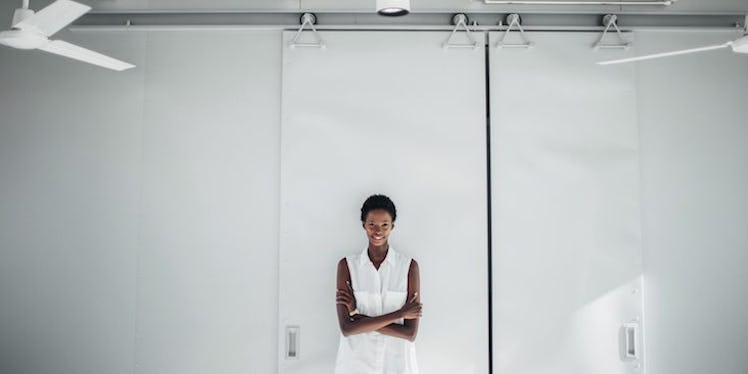
A Survey Says Black Women Are The Most Confident, But We Still Have Struggles
Black women are the most confident female group according to a study conducted by Glamour magazine and L'Oreal Paris. The study surveyed 2,000 white, black, and Hispanic women from all 50 of the United States. Findings showed that black women find themselves successful, beautiful, and have an overall higher level of body positivity. These results may seem a little odd, since black women are routine victims of systemic racism and sexism. That is why it is important to acknowledge that while higher levels of confidence is wonderful, black women still have struggles and need help to end those oppressions.
According to the study, 44 percent of black women described themselves as successful, compared to 25 percent of white women and 32 percent of Hispanic women. Fifty-six percent of black women shared that they were proud of they person they were becoming. When asked if they are proud of the person they are, 47 percent of black women agreed, compared to 37 percent of white women and 34 precent of Hispanic women.
As a black woman, this surprises me very little. I was raised, like a lot of other black women that I know, to have confidence and to give myself credit in areas that racism and discrimination might lead the world to never give me. We were taught in the home that the one thing we would certainly have to learn to do was to acknowledge and celebrate ourselves, while expecting little from mainstream (read: white) America.
These types of lessons have materialized in various ways in the media. Think Essence magazine, a publication created in the late '60s to uplift black women who wouldn't be shown as prominently in other magazines. On Twitter, the hashtag #BlackGirlMagic exists to celebrate everyday black women, who exist outside of the fashion and beauty industry.
Then there's also the Black Girls Rock hashtag and organization, which is responsible for an annual show that celebrates black female entrepreneurs, philanthropists, and entertainers.
Although awards shows like the Oscars and the Grammys have begun to make diversity a larger priority in recent years (thanks, in large part, to the outcry of people of color), those previously mentioned methods were the ways that black women used to uplift themselves when mainstream America seemed to pretend we didn't exist.
A black woman's confidence is very real, but it also exists as a defense mechanism against the pain of feeling erased by a world that doesn't acknowledge black people or women as it should.
This is why it's important for people to read a survey that says black women are the most confident group without allowing it to be justification for not playing an active role in ending the racism and discrimination that we experience. A black woman's confidence is a beautiful thing, but it is not a solution for this world's many racial injustices.
Racism still hurts even the most confident, successful black women.
On Monday, Serena Williams wrote an essay for Fortune magazine about Black Women's Equal Pay Day. In it, she detailed the struggles she has experienced as a financially successful African-American woman. She also acknowledged that the rest of the 24 million black women living in the United States are not all in the same economic position as she is, and are having to deal with a wage gap that disadvantages them on top of the other discriminatory practices going on in this country.
Former First Lady Michelle Obama, who resided in the most powerful house in the country for eight years, also opened up about how racism affected her while her husband, Barack Obama, was in office. She acknowledged that the many racist comments aimed toward her did hurt her feelings and that she had to "ignore all of the noise and be true to myself— and the rest would work itself out."
Confidence is great but it isn't the only thing that can or even should protect black women. Black women are still underpaid, disrespected on the job, discriminated against because of their cultural hairstyles, more likely to be sexually assaulted yet unprotected on college campuses, and also dealing with having their culture stolen and profited from by non-black women.
That's a hard burden to carry, no matter how confident you are. Take the time to marvel at the resilience of black women, but then let's all get back to the business of ending institutionalized racism and discrimination.